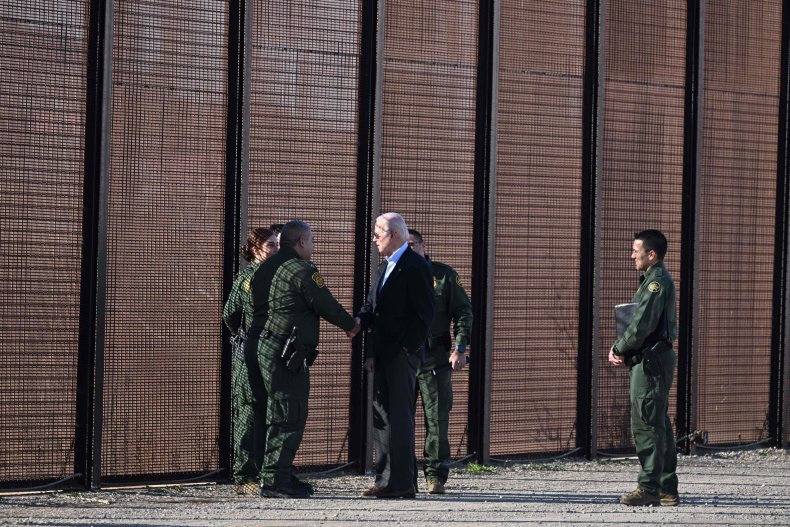The Biden administration has faced increasing pressure over its immigration policies recently, as Title 42, a regulation introduced under President Donald Trump, is set to be lifted in the next few weeks.
Invoked at the start of the COVID-19 pandemic in 2020 as a means to block most asylum seekers from entering the United States, more than 2 million people have been expelled from the U.S.-Mexico border since its implementation.
With President Joe Biden receiving criticism for sending 1,500 troops to the southern border ahead of Title 42's expiration, some claimed that the White House had boasted of a staggering 90 percent drop in illegal immigration recently.

The Claim
A tweet by user @TimRunsHisMouth, posted on May 2, 2023, viewed 1.8 million times, said: "This might be the worst lie ever told by a White House Press Secretary:
'When it comes to illegal migration, you have seen it come down by more than 90%, and that's because of the actions that this president has taken.' - Karine Jean-Pierre"
The tweet attached a clip of Jean-Pierre that included the quote.
The Facts
Newsweek's Fact Check team recently examined other comments Jean-Pierre made on immigration in which she claimed that "unlawful immigration" was down. While by some measurements her claim was correct, it was not a broadly accurate summary.
Similarly, while the claim that illegal immigration has fallen by 90 percent is correct by some measurements, the context of the surrounding conversation and a lack of detail provided by Jean-Pierre makes its reference here somewhat confusing.
Jean-Pierre made the "90 percent" claim on May 1, 2023, the clip of which was attached to the tweet posted by @TimRunsHisMouth.
Answering questions on what actions the administration had taken to tackle "illegal immigration," Jean-Pierre talked about the "tools" the Biden administration had used to "deal with the immigration system in a humane way" including the "parolee program."
Jean-Pierre said: "And that's why you've seen the parolee program be so successful. It has—it has—it has—when it comes to illegal migration, you've seen it come down by more than 90 percent, and that's because of this act—the actions that this president has taken."
The program was part of a series of actions the Department of Homeland Security (DHS) took to prepare for the end of Title 42. It was first implemented in October 2022 to address the high number of Venezuelan people entering the U.S., giving Venezuelan nationals a lawful route to enter the United States, subject to a set of eligibility requirements.
Under the program, Venezuelan nationals would first require a supporter in the United States who agreed to provide financial support, would have to pass national security and public safety vetting, and agree to fly at their own expense to an "interior U.S. port of entry (POE), rather than entering at a land POE." Only those who met these criteria would be eligible to be considered for parole for entry.
The program was then expanded on January 5, 2023, to include people traveling from Cuba, Haiti and Nicaragua.
U.S. Customs and Border Protection noted that after it was implemented, encounters of Cubans, Haitians, Nicaraguans and Venezuelans "between Ports of Entry at the southwest border declined from a 7-day average of 1,231 on the day of the announcement on January 5, to a 7-day average of 46 on February 28—a drop of 98 percent. (Newsweek noted that the percentage decrease between these dates is actually 96 percent and emailed the CBP's media representatives for clarification.)
This, at least by one metric, suggests that the program might have had some success, even if the inference is correlative. A White House spokesperson confirmed that the decrease was the "90 percent" statistic Jean-Pierre was referring to.
At a press conference on May 2, 2023, Jean-Pierre was asked to clarify the 90 percent claim and, again, mentioned the parole program, although perhaps not in the clearest terms.
"So I was speaking to the parolee program," she said. "As you know, the president put in place a parolee program to deal with—to deal with certain countries on—on ways that we can limit illegal migration. And we have seen—the data has shown us that it has gone down by more than 90 percent. That was what I was speaking to."
While we can therefore say that Jean-Pierre accurately referenced a real statistic on immigration, the use of that particular statistic might have caused some confusion in the context of the conversation that surrounded it.
For example, at the press conference on May 1, 2023, Jean-Pierre was asked: "How does the president want to address this challenge of illegal immigration?"
Jean-Pierre then mentioned "the parolee program" despite it not being mentioned during the conference and it being just one program that, by its nature, excludes statistics from other migrant populations entering the U.S. along its southern borders.
Again, her response on May 2, 2023, was not much clearer. Although she referenced the parolee program, this was also not mentioned elsewhere that day. Her answer did not mention the details of the program or the populations that it involved.
The White House and DHS are not secretive about their overall immigration statistics. Southwest border apprehensions and encounters under Title 8 and Title 42 decreased in January and February this year but rose in March. Encounters under both titles rose last month, according to data from U.S. Customs and Border Protection.
While the number of encounters under these titles is lower than it was in March 2022, the fiscal year total for 2023 is 160,674 higher than at the same point in the fiscal year 2022. Still, the average number of apprehensions in the first three months of the year is lower than it was in the first three months of 2022 (even if they were preceded by significantly higher encounters between October and December compared to the year before).
In the case of Jean-Pierre's "90 percent" claim, whether by design or accident, the terms of reference used were too unclear to understand and, arguably, the use of the parole program statistic was not the most appropriate when asked about overall immigration figures.
The Ruling

Needs Context.
The percentage claim refers to a seven-day rate, recorded between January to February 2023 of Venezuelans, Haitians, Cubans and Nicaraguans crossing the U.S.-Mexico border. The White House attributed a drop in these crossings to a parole program it enacted in January 2023.
Jean-Pierre referenced the parole program when she made the claim. However, it was not entirely clear that she was referring to a statistic she claimed was related to this program. Adding to the confusion, she quoted the statistic in response to a question about overall immigration. Arguably, that statistic might not have been the most appropriate or useful to quote.
FACT CHECK BY Newsweek's Fact Check team
Read more about our ratings.








